After scrambling around Hollywood for parts where few are offered to Asian actors, Trieu Tran says, “I told myself I’d give myself one year or take the LSAT and apply to law school.” That deadline passed, so he took the test and didn’t score as high as he’d hoped. “But a week afterward, I got Tropic Thunder“—which he can laugh about now.
Tran’s face doesn’t immediately spring to mind from that 2008 satire, directed by Ben Stiller. And I haven’t seen him on HBO’s The Newsroom, where he has a recurring role as Joey Phan. Tran helps refresh my memory: He was one of Stiller’s captors, he explains, “the one dancing around with coconut tits and an AK-47.” More important, besides “allowing me to spend two months in Kauai with Ben Stiller,” the role gave him a reprieve from the family expectations he addresses in his show.
As a first-generation immigrant from Vietnam, says Tran, “My home was pretty much ‘Education, education, education’ . . . trying to assimilate, to make sure I got straight A’s.” Driving from college to Hollywood was not part of the program. But whether conforming to or rebelling against the pressure to be a perfect son, Tran avows, “All immigrants face the same problems.” Yet Jews, Italians, and Irish have a body of immigrant literature to show, along with memoirs and movies. The African-American experience was told later, but it was told.
This isn’t the case for Vietnamese-Americans, says Tran. “You go in a bookstore even now, is there a Vietnam section? No. Vietnam history is under American history. All the books about the Vietnam War are from the GIs’ perspective.” There’s been no equivalent to Roots, no PBS documentary, nothing specific to the Vietnamese experience—until Uncle Ho to Uncle Sam, a one-man show Tran wrote with the editorial guidance of Robert Egan (who directs), premiered last Thursday at ACT. (We’ll review it next week.)
Uncle Ho covers a lot of ground, beginning with Tran’s dramatic childhood escape from Vietnam. “I pretty much remember it from that night we left,” he recalls. “In the middle of the night, I’ve got my sister on my back, going through the jungle to where we’d hidden the canoe, to get to the boat. It was kind of like an adventure—we were going to freedom! Then we got on the boat and we got attacked by pirates.” Following their father, who’d previously escaped, Tran, his mother, and two sisters then spent months in a refugee camp in Thailand.
Tran’s family was reunited in Canada, where he had to learn English in a hurry. He continues, “I came very young. I was, like, 7 1⁄2. The struggle for me was having to balance the two languages within the home. My first year in Canada, hanging out with the Caucasian kids, all I learned was the swear words. I was growing up in Saskatoon, Saskatchewan, which is pretty white. We were fresh off the boat. At my school, me and my sisters were the only Asians.”
Later settling in Boston after a family tragedy (explained in the show), the teenage Tran strayed into gang membership. He recalls, “I didn’t have any role models. I didn’t have a father figure. It was easier to look at other examples, probably bad examples . . . criminals and thugs. There are teenagers on the street corners, drinking beer and smoking weed. Gangster rap came out, and everyone wanted to walk around with baggy pants and a sideways baseball cap, talking shit. For me, it was all about protection, not wanting to get my butt whipped after school, so I joined [a gang]. I didn’t feel it was wrong. They were my friends.”
The same ability to fit in marked the beginning of his acting career. He also adapted to college (American University in Washington, D.C.), where he changed majors from political science to theater; then came Hollywood, where his first film bit came in the 2001 stoner comedy How High.
Hollywood’s depiction of Asians—beyond Tran’s career—is also an important part of Uncle Ho, he explains. “Being Asian-American, we had no role models” on TV or at the movies. “Hollywood has slowly opened up its doors,” says Tran. “Very slowly. They don’t write the roles for us. And the roles they do write are mostly stereotypical. We’re asexual. We know kung fu.”
In a multimedia show that Tran says will be more John Leguizamo than Spalding Gray, Uncle Ho promises to topple a few of these stereotypes. Says Tran, “We’re not all quiet and docile.”








